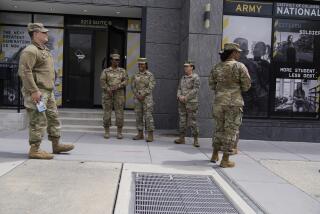In Reversal, Military Seeks Drug War Role
Less than a year after struggling mightily to avoid it, the armed forces have now abruptly reversed course and begun scrambling to win a principal role in the nation’s war on drugs--seeing it as a lucrative haven at a time when their traditional mission is shrinking.
Ambitious proposals that only recently would have been scorned as inappropriate have been pouring into the Pentagon and some already have been endorsed enthusiastically by Defense Secretary Dick Cheney.
The armed forces’ 10 top field commanders have proposed a host of new anti-drug missions that range from launching satellites to spying on cocaine traffickers to interdicting heroin shipments at sea as they are smuggled out of Southeast Asia.
“With peace breaking out all over,” one two-star general said in an interview, “it might give us something to do.”
The dramatic reversal reflects a calculated judgment by Pentagon leaders that getting a big piece of the drug war could help the military preserve its power as its postwar role as a counterforce to the Soviet bloc appears to be in decline, Administration officials said.
Among the plans endorsed last month are a list of long-term, “Category Three” ventures that would require more money for manpower and new technology.
If the plans are approved by the National Security Council and President Bush, the Pentagon officials believe the new tasks could provide the military with a renewed justification to demand funds for troops, ships and training missions now severely threatened by budget-cutters.
The sudden turnabout has also prompted animosity and concern from the federal agencies now in the forefront of the anti-drug effort.
“It’s been a 180-degree shift,” one top official said. “From too little to too much.”
“They’re the biggest kid on the playing field, and they want to punt, pass and kick,” another official said. “We may decide in the end that we would all be better off if they just tried to be good blockers.”
The details of the new Pentagon proposals remain classified, and the critics said they could not discuss the elements that made them the most wary. But as an example of their concerns, two high-ranking anti-drug officials cited a new military task force formed last month to help in reconnaissance and drug interdiction along the Mexican border.
The creation of that team, known as Joint Task Force-6, piqued international tensions when the Mexican government accused the United States of militarizing the Southwest border. And it has since stirred tensions among other anti-drug agencies over what they regard as the military’s cavalier approach to a sensitive task.
“They seem to want to do the job all by themselves,” said one official who has taken part in meetings designed to resolve the dispute. He said the Ft. Bliss, Tex.-based task force, commanded by Lt. Gen. George R. Stotser, had not sought to coordinate its operations with the El Paso Intelligence Center or other federal agencies.
In an interview, the Administration’s top anti-drug official, William J. Bennett, said he believed it was “terrific” that Cheney and the armed forces commanders had been so “eager to get involved.” But he acknowledged that their aggressiveness had bruised some feelings.
“You’ve sort of got the Defense Department going all around the place, saying: ‘What about this? What about there? What about here?’ ” said Bennett, the director of the Office of National Drug Control Policy.
“One of the agency heads said to me, ‘These guys are great, but you know it’s like having an 800-pound gorilla fall in love with you. You know, ‘ Roarrrr-- I like you a lot.’ ”
“You’ve got this little operation somewhere and the (military) comes in and says: ‘Hey, how’d ya like 5,000 men?’ So we’re sorting it out,” Bennett said. “You’ve got to be careful.”
The extraordinary change in Pentagon anti-drug posture in the last nine months has almost entirely eclipsed the hands-off approach that Defense Secretaries Caspar W. Weinberger and Frank C. Carlucci doggedly maintained even in response to the pleas of Congress.
“Our military is not trained to read people their Miranda rights,” Carlucci retorted in congressional testimony last year. “They’re trained to shoot to kill.” Soldiers are not trained as law enforcement officers and already had an essential job defending the nation’s security, he insisted.
Pentagon officials attributed much of the turnabout to the influence last spring of Cheney and Gen. Colin L. Powell, who was preparing to take over as the new chairman of the Joint Chiefs of Staff. They recognized the growing priority of the anti-drug effort to the new President and public, and accordingly began to draft new plans.
In September, Cheney made the new thinking clear by declaring drugs a “direct threat to the sovereignty and security of our country.”
The dramatic changes in the Soviet Union and Eastern Europe, lessening the military threat the Pentagon was geared up to meet, added even more impetus.
Prior to the sudden prospect of dramatic cuts in the Pentagon budget, one source said, the Joint Chiefs of Staff were expected to treat anti-drug proposals from senior commanders critically. Amid the “shock” of a changing world, he said, the proposals “must have seemed a godsend.”
“Getting help from the military on drugs used to be like pulling teeth,” said Lawrence J. Korb, a former assistant secretary of defense in the Ronald Reagan Administration. “Now everybody’s looking around to say: ‘Hey, how can we justify these forces?’ And the answer they’re coming up with is drugs.”
Air Force analysts have suggested the service might expand the use of its radar capability to monitor drug trafficking. In an outgrowth of that thinking, the service has proposed that the Airborne Warning and Control System, or AWACS, aircraft be dispatched on a series of flights to take place near Colombia in coming months, sources said.
The longer-term Air Force proposals would enlist high-resolution spy satellites to provide glimpses of shifting ground bases for drug traffickers, including drug processing laboratories hidden deep in jungles. They might also give a boost to systems such as the Joint Service Targeting and Reconnaissance System, a high-priced radar designed to plot Warsaw Pact troop movements that some believe could offer an unparalleled view of drug traffickers, one analyst said.
Navy budget planners have come up with an ingenious plan to resolve their own dilemma: how to operate its growing number of ships with a diminishing pot of money.
Their solution, proposed in October and expected to win final approval from the White House within a week, was to shift some Atlantic training operations to the Caribbean, where they could serve double duty by keeping watch on drug trafficking from international waters off Colombia.
The Navy move, which could station as many as 90 aircraft and 12 ships in the region, would ensure a continued source of training funds--and with them, steaming hours--for the Atlantic Command, even as the budget dips in the coming years.
One retired Navy officer likened the Navy’s new-found enthusiasm for the drug mission to the service’s no-holds-barred bid to get its own nuclear weapons in the 1950s.
“We were going to get our share of the nuclear mission no matter what the cost,” said retired Rear Adm. Eugene Carroll, deputy director of the Washington-based Center for Defense Information. “Now drug interdiction is at least a raft to keep you afloat.”
BACKGROUND
Congress first urged the Pentagon to assume a major role in the war on drugs in 1987, but the armed services resisted the call on grounds that it would detract from their war-preparedness roles. A turnabout began in September, when new Defense Secretary Dick Cheney identified drug-fighting as a top-priority military mission. The change has accelerated with the events in Eastern Europe.
More to Read
Start your day right
Sign up for Essential California for news, features and recommendations from the L.A. Times and beyond in your inbox six days a week.
You may occasionally receive promotional content from the Los Angeles Times.







